Festivals - Colcoa 2017 : an excellent selection of french movies
By Mulder, Los Angeles, 20 april 2017

The Franco-American Cultural Fund is pleased to announce the dates for the 21st Anniversary of the COLCOA French Film Festival which will take place April 24 - May 2, 2017.
COLCOA FRENCH FILM FESTIVAL, "9 Days of Premieres in Hollywood", was founded in 1997 by The Franco-American Cultural Fund, a unique collaborative effort of the Directors Guild of America, the Motion Picture Association, the Writers Guild of America West, and France’s Society of Authors Composers and Publishers of Music (SACEM). COLCOA is also supported by l’Association des Auteurs-Réalisateurs-Producteurs (ARP), the Film and TV Office of the French Embassy in Los Angeles (French Consulate), the CNC, TVFI, and UNIFRANCE.
COLCOA is the acronym of “City of Light, City of Angels” the original name of an event celebrating relationships between filmmakers from two capital cities of cinema.
Since 2015, the festival’s name has officially become COLCOA FRENCH FILM FESTIVAL. The festival takes place in April in the prestigious theaters of the Directors Guild of America on Sunset Boulevard in Hollywood (3 theaters (600, 160 and 37 seats), a 210 capacity lounge and a 1,500 capacity lobby).
The 21st Annual COLCOA FRENCH FILM FESTIVAL COLCOA will have an exclusive program of 70+ French Films at this year's festival. This festival will take place in the Directors Guild of America - 7920 Sunset Blvd. - Los Angeles, CA 90046
COLCOA FRENCH FILM FESTIVAL is committed to promoting new French films in the U.S. and to showcasing in Hollywood the vitality and the diversity of French cinema and, since 2015, French television programs.
A bag of Marbles (Un sac de billes) (2017) (110mns)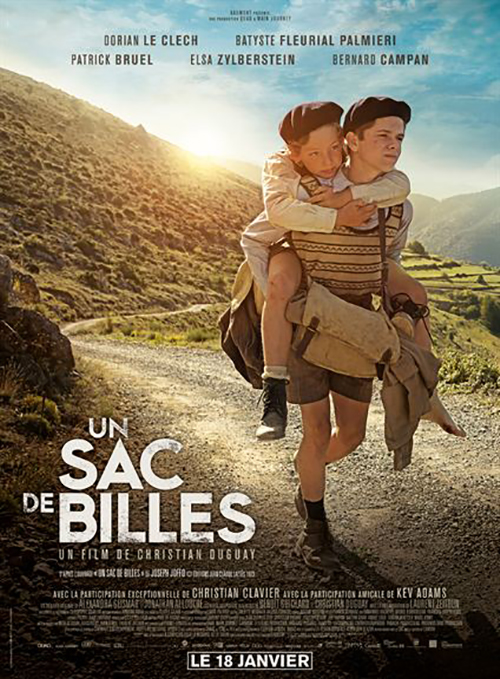 Directed by: Christian Duguay
Directed by: Christian Duguay
Written by: Alexandra Geismar, Jonathan Allouche, Benoît Guichard, Christian Duguay, Laurent Zeitoun
Cast: Dorian Le Clech (Joseph), Batyste Fleurial (Maurice), Patrick Bruel (Roman), Elsa Zylberstein (Anna), Bernard Campan (Ambroise Mancelier), Kev Adam (Ferdinand)
Synopsis: This heartwarming adaptation of Joseph Joffo’s enduring memoir tells the story of the Nazi occupation through the eyes of two young Jewish boys struggling to survive on their own. Paris, 1941: Joseph and Maurice are the sons of Roman, the local barber. At 10 and 12, the boys have so little understanding of the persecution of Jews that Joseph thinks nothing of swapping his yellow star for a bag of marbles. Despite their naiveté, Roman knows that their best chance to escape the Nazi roundup is to flee on their own to Vichy France, where their older brothers Albert and Henri have found safe haven. Always one false move from tragedy, these tenacious urchins survive on courage, ingenuity and more than a bit of cunning as they make their precarious way through France hoping to reunite with their family. More than anything, it’s their brotherly bond that gets them through their ordeals. Patrick Bruel resonates as the Jewish family patriarch Roman, while newcomers Dorian Le Clech and Batyste Fleurial register an almost agonizing vulnerability as hapless innocents trying to outrun the barbarous machinery of war.
Production Notes: When it comes to choosing subject matters for his films, writer/director Christian Duguay isn’t easily intimidated. After all, Joseph Joffo’s widely admired holocaust autobiography has sold more than 20 million copies over the years. On top of that, the book has been adapted once before, by the brilliant auteur Jacques Doillon in 1975, a film now regarded as an early masterpiece. But Duguay felt that the story still had enough untapped potential to warrant a version that more faithfully followed the book. Duguay was last represented at COLCOA in 2013 with his popular Jappeloup, about a friendship between a man and his miraculous show-jumping horse. A French Canadian, Duguay first made his mark directing Emmy and Golden Globe-winning television miniseries. His transition to the big screen began with genre films in Hollywood, including The Assignment (1997), starring Donald Sutherland and Ben Kingsley, and the Wesley Snipes actioner The Art of War (2000). Duguay pivoted to drama with the acclaimed miniseries Hitler, The Rise of Evil (2003), and Coco Chanel (2008), starring Shirley MacLaine and Malcolm McDowell.
Our review (French) : https://mulderville.net/fr/critiques/4614/un-sac-de-billes
A kid (Le Fils de Jean ) (2016) (98mns)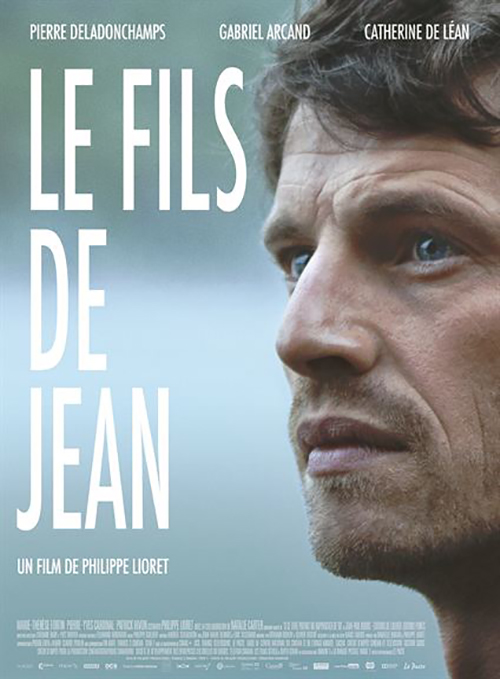 Directed by: Philippe Lioret
Directed by: Philippe Lioret
Written by: Philippe Lioret, Natalie Carter
Cast: Pierre Deladonchamps (Mathieu), Gabriel Arcand (Pierre), Catherine de Léan (Bettina), Marie-Thérèse Fortin (Angie)
Synopsis : In this layered family drama, Stranger by the Lake revelation Pierre Deladonchamps delivers another sharply nuanced performance as Mathieu, a young Parisian divorcé who receives a call out of the blue. The caller tells Mathieu that his father, Jean, whom he has never known, has died and has left a package for him. Hoping to discover his roots, Mathieu decides to attend the funeral in Quebec. Upon arrival Mathieu is surprised to learn that his father died in a boating accident and that the body has still not been recovered. Jean’s best friend, a certain Dr. Pierre, convinces him to hide his true identity from Jean’s two adult sons from another mother. Mathieu’s precarious situation becomes even less manageable when, after the police call off the search, he joins his half-brothers as they continue to look for the body on their own. What they dredge up is mostly buried resentment and conflicting emotion. A Kid is a poignant examination of identity and paternity from one of contemporary French cinema’s most discerning eyes.
Productions Notes: Ten years before Stephen Spielberg’s The Terminal, writer/director Philippe Lioret exposed the hidden airport subculture of permanently stranded travelers with no legal standing in his feature debut Lost In Transit (1993), starring Jean Rochefort. Lioret, followed up with films starring favorite collaborators Jacques Gamblin and Sandrine Bonnaire, honing the lighter style he had already established. Lioret began his transition to realist drama with The Light (COLCOA 2005). His breakthrough film Welcome (COLCOA 2009 Audience Award winner), invited audiences to sympathize with the plight of illegal immigrants who risk everything for a better life in France. Despite the controversial subject, the film was nominated for ten César Awards, including best film, best director, and best screenplay. Today, Lioret is best known for his closely observed characters and thematically complex, impressionistic storytelling.
A tast of Ink (Compte tes blessures) (2017) (80mns)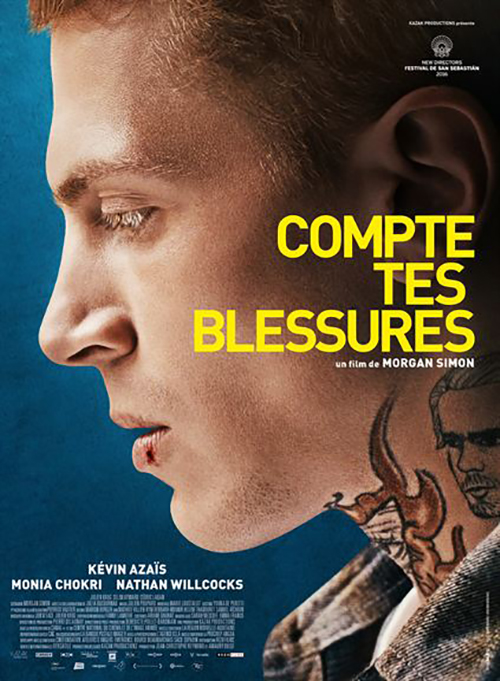 Written and Directed by: Morgan Simon
Written and Directed by: Morgan Simon
Cast: Kévin Azaïs (Vincent), Monia Chokri (Julia), Nathan Willcocks (Hervé Vlanine), Julien Krug (Matthew)
Synopsis : This punchy but sensitive drama set in the Paris underground music scene marks the debut of a filmmaker to watch. On stage, post-punk singer Vincent (Azaïs) is an explosion of animal furies convulsing with emotional intensity. But back at home, with the mic unplugged, Vincent is more inclined to let his tattoos do all the talking. Since his mother died, Vincent’s feelings of alienation and disorientation have only increased. At 24, with a day job that won’t pay for his upkeep, he lives like roommates with his father Hervé. Everything changes when Hervé shacks up with a new girlfriend only a few years older than Vincent. Vincent’s anger, jealousy, and grief are soon roiling in a potent brew. But when his new “mother” becomes the object of his desire, the mix is ready to blow. Kévin Azaïs, who made an indelible impression with Love at First Fight (COLCOA 2015), brings a searing charisma to the role of Vincent.
Production notes: Winning the special mention of the jury at the 2016 San Sebastian International Film Festival, A Taste of Ink was the culmination of themes that writer/director Morgan Simon had been developing since his 2012 short American Football. The film, which revolved around a tattooed front man for a punk band, had already raised the question of alternative culture in a society where everything is commodified. His next short, Try To Die Young (2014) centered on a father/son conflict. With a background in biology, Simon enrolled in the writing department of La Femis. His script won the 2014 Prix Junior Screenplay Grand Prize, and was subsequently developed at the workshops of the Cannes Cinefondation Atelier, the Jerusalem International Film Lab, and Emergence, which gave him the opportunity to shoot some scenes and to meet actor Kévin Azaïs.
A woman’s life (Une Vie) (2016) (119mns)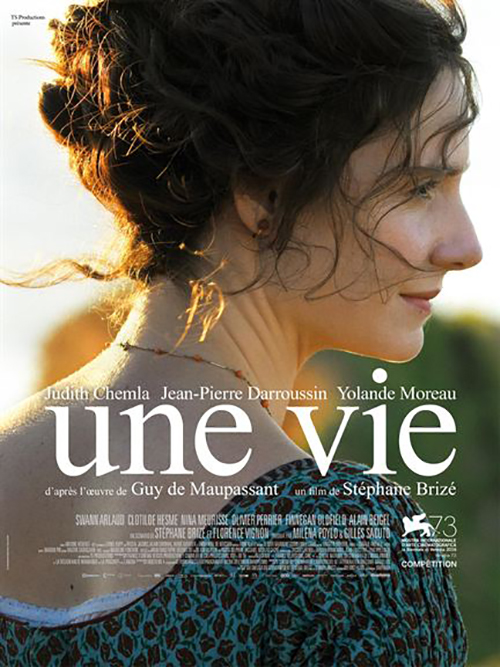 Directed by: Stéphane Brizé
Directed by: Stéphane Brizé
Written by: Stéphane Brizé, Florence Vignon
Cast: Judith Chemla (Jeanne), Jean-Pierre Darroussin (Le Baron), Yolande Moreau (La Baronne), Swann Arlaud (Julien), Nina Meurisse (Rosalie), Clotilde Hesme (Gilberte de Fourville)
Synopsis: Winner of the prestigious Prix Louis-Delluc for 2016, A Woman’s Life brings a formalistic rigor to Guy de Maupassant’s essential French novel Une Vie; the result is a rare costume drama that refuses to romanticize the world it depicts. Spanning the life of the aristocratic but essentially powerless Baroness Jeanne Le Perthius des Vauds, the saga begins in Normandy 1819, when Jeanne is leaving the convent where she has been raised and educated. Jeanne’s sheltered and idyllic upbringing sets her up for a lifetime of bitter disappointments beginning with an arranged marriage to Julien de Lamare. Her imagined prince charming quickly turns into a philandering ne’er-do-well after he gains control of Jeanne’s inheritance. Tight framing, elliptical scenes, and shifting timelines lend immediacy to this moving depiction of a woman boxed in by a repressive society organized first and foremost to preserve the privilege of a few highborn men. Judith Chemla’s meticulous performance as Jeanne earned a nomination for a 2017 Best Actress César Award.
Production Notes: Those who have followed the career of writer/director Stéphane Brizé might be surprised by his foray into period drama. His most recent films were the somber, Bergmanesque A Few Hours of Spring (COLCOA 2013) and the social realist drama Measure of a Man (2015), which boasted only one professional actor - repeat collaborator Vincent Lindon. But what might be a stylistic departure still contains common Brizé themes: the difficulties of romantic relationships and the seeming impossibility of communicating one’s deepest feelings to others. For the task of adapting Guy de Maupassant’s sprawling classic, Brizé reunited with co-writer Florence Vignon. The pair previously won a César Award for their adaptation of Eric Holder’s novel about forbidden love, Brizé’s fourth feature, Mademoiselle Chambon (COLCOA 2009). Among its many accolades, A Woman’s Life was awarded the coveted FIPRESCI Award at the 2016 Venice Film Festival.
Alibi.com (Alibi.com) (2017) (90mns) Directed by: Philippe Lacheau
Directed by: Philippe Lacheau
Written by: Philippe Lacheau, Julien Arruti, Pierre Dudan
Cast: Philippe Lacheau (Grégory Van Huffel), Élodie Fontan (Flo Martin) Julien Arruti (Augustin), Tarek Boudali (Mehdi), Nathalie Baye (Mme Martin), Didier Bourdon (M. Martin)
Synopsis : The comedy team behind the Babysitting franchise returns to COLCOA with another affable concoction of high-concept farce and below the belt gags. Grégory (Lacheau) is the founder of a startup providing a unique service. He and his associates Augustin and Medhi create and stage alibis for clients, mostly men, mostly who want to cheat, mostly on their wives and girlfriends. While striving for the lofty goal of semi-competence, the crew’s only code of conduct is summed up in the company motto: “a little lie is less harmful than the truth.” Naturally, Grégory has to keep his work a secret from his new girlfriend Flo, who happens to be repulsed by men who lie. But that’s only half his problem. When Grégory and Flo go to a resort town to meet her parents, he realizes that he knows the father. In fact, he’s one of Grégory’s clients. Alibi.com is a manic, take-no-prisoners excursion through a PC-free zone, so give your moral compass the afternoon off, and strap in for the ride.
Production Notes: With the popularity of his first solo directing effort, actor/co-writer/director Philippe Lacheau has staked solid ground in contemporary French comedy. The star and co-writer/co-director of the found-footage comedy hits Babysitting (COLCOA 2014) and its sequel All Gone South - Babysitting 2 (COLCOA 2016), Lacheau’s roots are in sketch comedy. Along with actor/co-writer Julien Arruti (Augustin) and actor Tarek Boudali (Medhi), Lacheau first gained notoriety as part of the French TV comedy troupe La Bande à Fifi. As Fifi, Lacheau was a host and presenter for FUN TV channel, and has appeared in many shows, notably Le Grand Journal de Canal+. Together with his usual writing partner Julien Arruti, Lacheau penned the script with newcomer Pierre Dudan. Lacheau plays the lead in Tarek Boudali’s directorial debut Mariage (blanc) pour tous, currently in post-production. A third installment of the Babysitting franchise is also in the works
Ares (Ares) (2016) (80mns)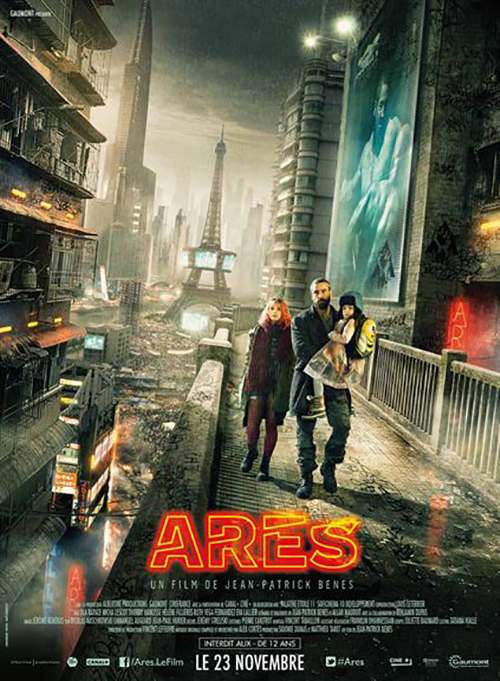 Directed by: Jean-Patrick Benes
Directed by: Jean-Patrick Benes
Written by: Jean-Patrick Benes, Allan Mauduit, Benjamin Dupas
Cast: Ola Rapace (Ares), Micha Lescot (Myosotis) Thierry Hancisse (Coach) Hélène Fillières (Altman),
Synopsis: This testosterone-fueled dystopian thriller is set in a demi-apocalyptic Paris of 2035. Disillusioned masses huddle in polluted shantytowns at the feet of monuments. Multi-national conglomerates control the government, including the police. As a diversion from the misery and poverty, much of the population turns to the Arena, a televised spectacle of ultraviolent gladiatorial contests. Competing pharmaceutical companies openly dope Arena fighters as a means of advertising their performance enhancing products. Ares, played by hunky Swede Ola Rapace (Skyfall), is a former contender long past his prime, but when his sister is arrested on trumped up charges, this badass with a heart of gold agrees to be a guinea pig for the latest wonder drug. If it works, he might win enough fights to buy her freedom. Only trouble is, no one has ever taken the drug and lived.
Production Notes: While the typical French filmmaker might shun pure genre, for his second feature writer/director Jean-Patrick Benes has embraced it. Looking at the economic crisis in Greece, Benes wondered what France would be like under similar circumstances. To create this devastated Paris on a restricted budget, Benes was quick to make use of every resource available to him, even filming in the chaos of Kiev’s Maidan occupation. Benes scored a surprise hit with his first feature, the cult comedy Ugly Melanie (2008) co-directed with Allan Mauduit. In 2012, the two created the canal+ comedy series Kabul Kitchen, about a French entrepreneur trying to succeed with a French restaurant in war-torn Kabul. For the Arès screenplay, Benes and Mauduit teamed up with the prolific series television writer Benjamin Dupas.
Our review (French) : https://mulderville.net/fr/critiques/4624/alibi-com
Cease-fire (Cessez-le-feu) (2017) (103mns)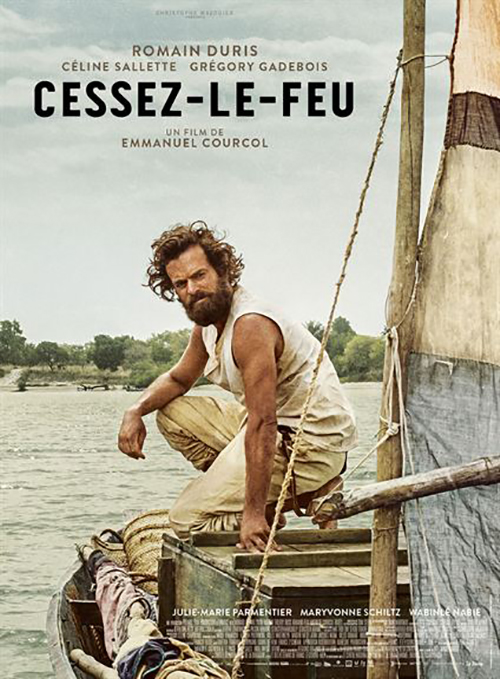 Written and Directed by: Emmanuel Courcol
Written and Directed by: Emmanuel Courcol
Cast: Romain Duris (Georges Laffont), Céline Sallette (Hélène), Grégory Gadebois (Marcel Laffont), Julie-Marie Parmentier (Madeleine) Maryvonne Schiltz (Louise Laffont), Wabinlé Nabié (Diofo)
Synopsis: This classically elegant period drama explores the aftermath of war through the struggles of a French family to resume normal life after the traumas of WWI. Romain Duris puts on a rakish front as Georges Laffont, a man who has lost his way after horrific trench warfare leaves him emotionally scarred. It’s the beginning of the roaring 20s, but the era’s carefree decadence doesn’t touch the Laffonts. They are still reeling from the loss of an eldest son, gone missing on the field of battle, and the travails of Georges’ third brother, Marcel, who has returned from the war unable to speak or hear. Rather than confronting his own shellshock, Georges retreats to the Upper Volta colony of West Africa. There he roams the countryside recruiting laborers for Ghanaian plantations and spinning tales of the Great War with the aid of Diofo, another war survivor. But Georges’ aimless existence gets a course correction in the form of Marcel’s kindly and attractive sign language teacher Hélène.
Production Notes: Although this is the first feature by writer/director Emmanuel Courcol, his career in film spans some 25 years. After studying law, Courcol was bitten by the theater bug and spent several years acting for the stage. In the early 1990s he began to appear in feature films in secondary and supporting roles. A decade later he began a successful writing collaboration with director Philippe Lioret. They collaborated on four features, including Welcome (COLCOA 2009 Audience Award winner), for which both were nominated for a Best Original Screenplay César, along with Olivier Adam. For Courcol, whose grandfather fought in the trenches, the Great War is part of his own family story
Corporate (Corporate) (2016) (95mns)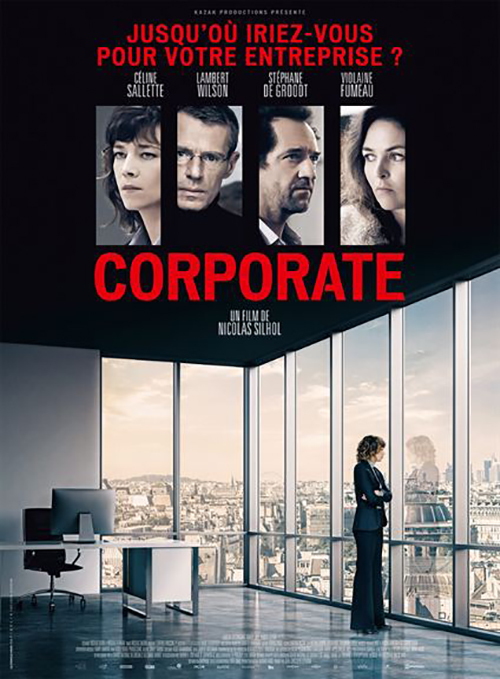 Directed by: Nicolas Silhol
Directed by: Nicolas Silhol
Written by: Nicolas Silhol, Nicolas Fleureau
Cast: Céline Sallette (Emilie Tesson-Hansen), Lambert Wilson (Stéphane Froncart),
Synopsis : This tightrope thriller takes a deep dive into the murky waters of corporate hierarchy to expose a high stakes game where the profit motive is eclipsed only by the prime directive: saving your own skin. Céline Sallette plays it cool as Emilie Tesson-Hansen, a woman who knows the rules of the game. As the head of Human Resources of a major conglomerate, she has mastered a calibrated femininity to match the ruthlessness and cold ambition expected from the higher-ups. When executive Stéphane Froncart (Lambert Wilson) devises a secret cost-cutting plan, he knows he can count on Emilie to implement it. What he doesn’t count on are the deadly consequences, and the resulting formal investigation into company practices launched by labor inspector Marie Borrel. Emilie recognizes herself in Marie, but where Emilie is guarded, Marie is spontaneous, even provocative. This spurs Emilie to question her role as a good company soldier, but as Stéphane tries to direct Marie’s probe in Emilie’s direction, she is torn between the welfare of her fellow employees and the prime directive.
Production Notes: This is the debut feature of writer/director Nicolas Silhol, who was first noticed for his 2009 short Tous les enfants s'appellent Dominique, winner of the CFC Worldwide Short Film Festival in Toronto, and Love Thyself, which screened in the Cannes Critics’ Week in 2010. The starting point for the story was a rash of suicides at France Telecom that scandalized Paris, but the social ramifications of the business world, especially the rigid hierarchies, always fascinated Sihol -- stemming from his father, who teaches at a business school and consults in Human Resources. Silhol developed the screenplay with newcomer Nicolas Fleureau.
Our review (French) : https://mulderville.net/fr/critiques/4664/corporate
Dalida (Dalida) (2017) (124mns)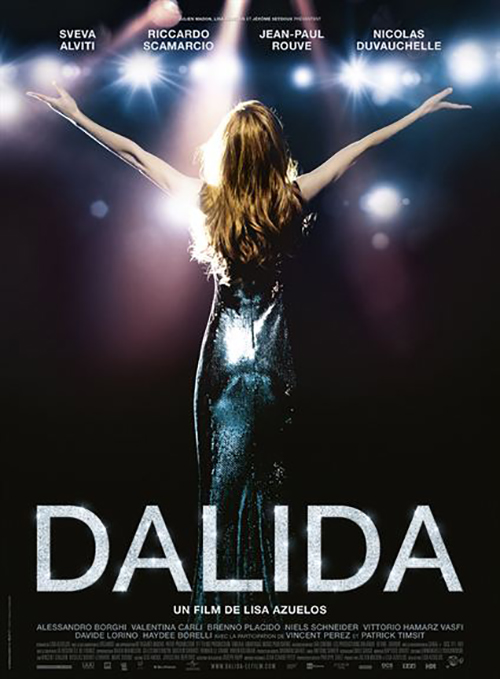 Written and directed by: Lisa Azuelos
Written and directed by: Lisa Azuelos
Cast: Sveva Alviti (Dalida), Riccardo Scamarcio (Orlando), Jean-Paul Rouve (Lucien Morisse), Nicolas Duvauchelle (Richard Chanfray), Alessandro Borghi (Luigi Tenco)
Synopsis: In the tradition of French chanson a singer’s ability to sell the audience on the emotions of the song is everything. Few did this better than Dalida. Over the course of 30 years beginning in the 1950s, this Egypt-born Italian became a French idol with a guileless voice and sensual stage persona, selling 170 million records worldwide. But all that professional bliss came packaged with a fair amount of private torture. This glittery biopic faithfully chronicles the complexities of being a liberated woman in a less liberated era, as well as the ferocious passions of a life in which, despite all the triumphs, suicide became a recurring theme. Lavish recreations of Dalida’s most memorable performances, as well as cleverly edited archive material, distill her stylistic range, from her early incarnation as a yé-yé girl to the sequins and polyester of the disco diva years. Unknown Italian model turned actress, Sveva Alviti, breaks through with a star-making performance, landing both the privately insecure woman and the legendary chanteuse with uncanny aplomb.
Production Notes: Knowing that casting can be a big hurdle with biopic, writer/director Lisa Azuelos made a bold decision to go with an unknown. Her international search for the perfect lead took her as far as Greece and Italy. For some this might be an extreme approach, but this was a passion project for a filmmaker not especially known for tackling heavier material. Azuelos got her first foothold in the industry as a writer for television comedy. She hit pay dirt with her 2008 runaway hit LOL, Laughing Out Loud ®, a comedy that so neatly bottled the zeitgeist of a generation, she was invited to remake the feature in Hollywood in 2012. She followed that up with the Francois Cluzet and Sophie Marceau starring Quantum Love (COLCOA 2014). To squeeze the events of Dalida’s life into a 2-hour screenplay, Azuelos worked closely with writer Jacques Pessis, and Dalida’s brother and manager Orlando who with novelist Catherine Rihoit, penned a biography of his beloved sister in 2009.
Our review (French) : https://mulderville.net/fr/critiques/4580/dalila
Elementary (Primaire) (2017) (105mns)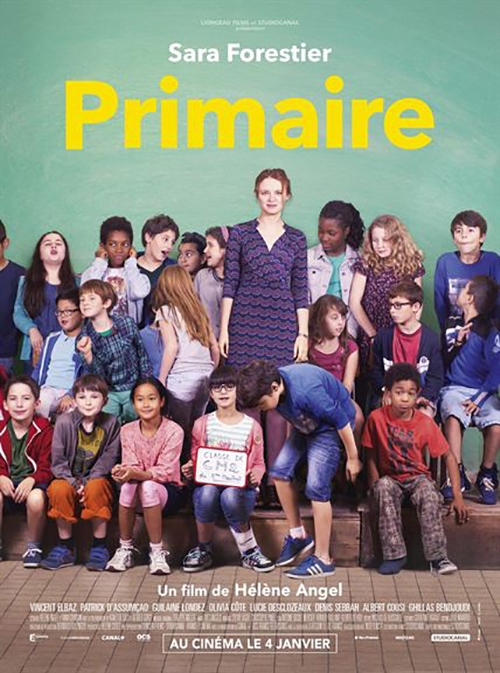 Directed by: Hélène Angel
Directed by: Hélène Angel
Written by: Hélène Angel, Yann Coridian, Agnès de Sacy, Olivier Gorce
Cast: Sara Forestier (Florence Mautret), Vincent Elbaz (Mathieu), Patrick d'Assumçao (M. Sabatier), Guilaine Londez (Ms Duru), Olivia Côte (Marlène Peillard), Lucie Desclozeaux (Laure)
Synopsis : This earnest schoolyard drama probes the moral and ethical dilemmas a teacher faces when emotional entanglements put her on a collision course with her professional responsibilities. For Florence, teaching isn’t a job, it’s a calling. She is so devoted to her students that she sometimes forgets that she is a divorced mother with a son of her own for which to care. When Florence encounters Sacha, an angry and emotionally abandoned child, her protective instincts take over, and she makes it her mission to save him from both an abusive mother as well as the institutional indifference of foster care. But the teacher is forced to learn a thing or two when she meets Mathieu, the ex-boyfriend of Sacha’s mother. Impetuous, emotional, live-for-the-moment Mathieu may not be the best father figure for young Sacha, but those same traits make him romantically irresistible to Florence. Sara Forestier (Suzanne COLCOA 2014), whose star has steadily ascended since her César-winning turn in The Names of Love (2010), anchors the classroom scenes with a satisfying slice-of-life performance.
Production Notes: Although writer/director Hélène Angel is best known for social dramas like her Golden Leopard-winning debut, Skin of Man, Heart of Beast (1999), her films are remarkably eclectic. The Red Knight (2003) is a medieval fantasy starring Daniel Auteuil as an immortal knight on a mission for the Pope. Her 2007 Arté documentary Hôtel des longues peines examined the lives of women whose men are serving time in prison. Forbidden House (2011) slyly combines elements of psychological horror and ghost story. Angel was looking for a more immersive approach with Elementary. She spent two years in a grade school researching that universe. Angel wrote the screenplay with Yann Coridian, in collaboration with Agnès de Sacy and Chocolat co-writer Olivier Gorce.
Everyone’s life (Chacun sa vie) (2017) (113mns)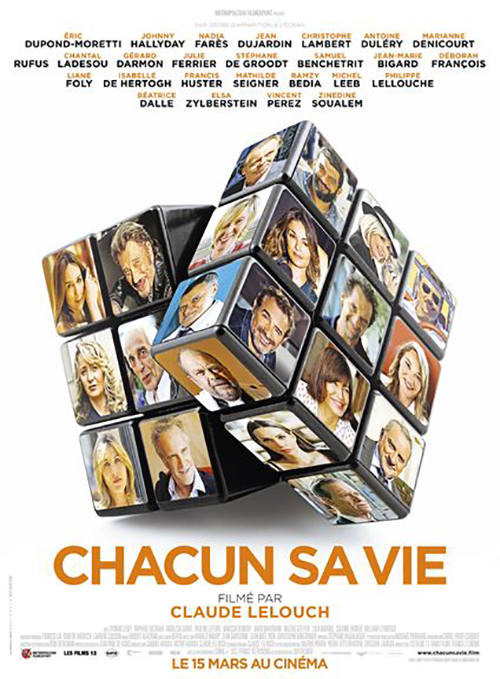 Directed by: Claude Lelouch
Directed by: Claude Lelouch
Written by: Claude Lelouch, Valérie Perrin, Grégoire Lacroix, Pierre Uytterhoeven
Cast: Éric Dupond-Moretti (The Judge), Johnny Hallyday (Johnny), Nadia Farès (Nadia), Jean Dujardin (Jean), Christopher Lambert (Antoine de Vidas ), Béatrice Dalle (Clémentine), Marianne Denicourt (Marianne), Mathilde Seigner (Mathilde)
Synopsis : Celebrating his 50-year career, director Claude Lelouch wanted to try something a little more daring and ambitious. So he gathered a veritable battalion of name actors in a provincial town in the Burgundy region. The result is a new film that playfully deconstructs narrative conventions while asking who among us has the moral right to sit in judgment of another? A jazz festival is swinging in the town of Beaune, but 12 men and 12 women have gathered for a different reason. A trial is taking place and they are here for the dispensation of justice, such as it is. Yet each of these judges, lawyers, or jurors--people from every walk of life--has a skeleton or two tucked in a closet: a billionaire who tries to seduce a tax inspector with a diamond necklace, an aging prostitute who confesses to a customer that he may play a role in the memoir she is writing, the real Johnny Hallyday who wants to press charges against a troublesome look-alike.
Production Notes: With a feature count fast approaching 50, writer/director Claude Lelouch remains a fixed point in the firmament of French cinema, a remarkable achievement given his reverence for chance and unpredictability on the set. According to first-time writing collaborator Grégoire Lacroix, the veteran director’s working motto is "accept the inevitable in order to be available for the unexpected." This approach served Lelouch well in 1966, when his sentimental love story, A Man and a Woman, rocketed him to international fame, along with a Palme d’Or and a Foreign Language Oscar. Although some have tended to brush Lelouch aside in recent years, his previous film Un + Une (COLCOA 2016) was a major success. Always looking for ways to translate his personal experience onto the screen, Lelouch was inspired this time by a court hearing he attended. From there, Lelouch developed the script with Lacroix, along with his longtime writing partner Pierre Uytterhoeven (with whom Lelouch shared a Best Screenplay Oscar in 1966), and his companion, Valérie Perrin.
Our review (French) : https://mulderville.net/fr/critiques/4655/chacun-sa-vie
Farewell Bonaparte (Adieu Bonaparte ) (1985) (115mns)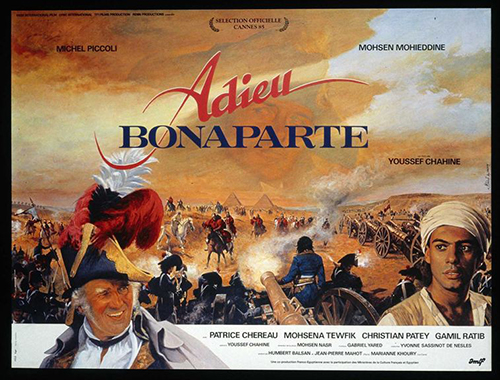 Directed by: Youssef Chahine
Directed by: Youssef Chahine
Written by: Yousry Nasrallah, Youssef Chahine
Cast: Patrice Chéreau (Bonaparte), Michel Piccoli (Caffarelli), Mohsen Mohiedine (Aly), Hassan Hussein (The father), Mohsena Tewfik (The mother), Mohamad Hatef (Yehia)
Synopsis: COLCOA is pleased to present this beautifully restored historical fresco from Egypt’s most celebrated filmmaker, Youssef Chahine. In 1798, the Turks have retreated and Napoleon’s army occupies Egypt. Arriving with the science expedition, General Caffarelli (Piccoli) falls under the spell of Egypt’s exotic aromas and people, especially Aly and Yehia, two young and idealistic Egyptian brothers, both refugees in Cairo, and both fascinated by Caffarelli’s extravagance and worldliness. While Napoleon, in a ferocious turn by Patrice Chéreau, sells his military adventure as liberation, Aly and Yehia see it as trading one oppressor for another, and seek ways to resist. Caffarelli, torn between his passions and his duty, must decide whose side he is on. Alternating between historical landscape and intimate portraiture, Farewell Bonaparte paints a prophetic picture of Egypt’s strained relationship with the West.
Production Notes: In 1985, writer/director Youssef Chahine was at the peak of his career. Just two years before, he had been invited to Cannes as a jury member. Now he was back presenting his 28th film, a big-budget opus he’d hoped would consolidate his growing international reputation. Instead the film was met with boos and attacked as anti-French. Today, Chahine’s work is being reassessed, and history seems to have vindicated his most pessimistic intuitions about the Middle East. Chahine’s prolific career began at the Pasadena Playhouse, where he studied acting. Never shying from controversy, his films tackled topics from repressed homosexuality to globalization. Chahine was given a lifetime achievement award in 1997 at Cannes, 46 years after his first appearance there. He died in 2008. This restoration is part of an ambitious effort by partners including La Cinémathèque française, the CNC, and the Franco-American Cultural Fund to restore and conserve Chahine’s entire body of work.
Heaven will wait (Le Ciel attendra) (2016) (105mns)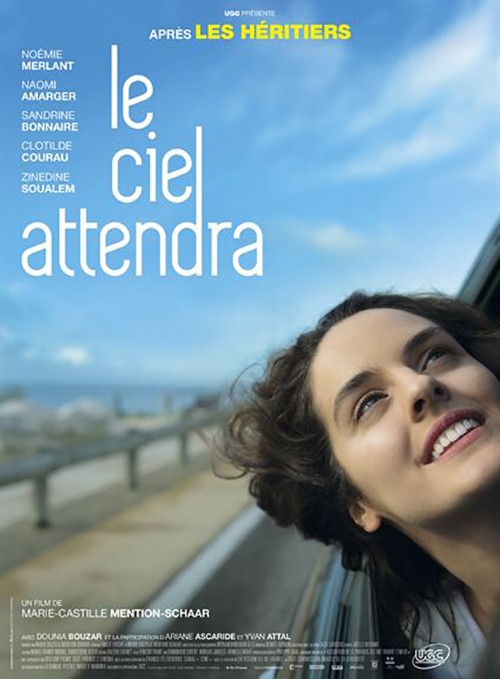 Directed by: Marie-Castille Mention-Schaar
Directed by: Marie-Castille Mention-Schaar
Written by: Marie-Castille Mention-Schaar, Emilie Frèche
Cast: Noémie Merlant (Sonia Bouzaria) Naomi Amarger (Mélanie Thenot), Sandrine Bonnaire (Catherine Bouzaria), Clotilde Courau (Sylvie), Zinedine Soualem (Samir Bouzaria)
Synopsis : With so many terrorist attacks in France over the last decade, radicalization has become the hot-button issue. Heaven Will Wait takes the topic head on with two disturbing stories about teenage girls heeding the siren call of ISIS. Sonia is just 17 when she is arrested for involvement in a planned jihadist attack. Angry at being prevented from joining her confederates in Syria, Sonia is placed under house arrest. A deprogrammer is called in to reintegrate her, but her shocked and devastated family fears she is lost forever. Then there’s Melanie, the studious, aspiring cellist, picture-perfect daughter. Her single-parent mother has no idea that she has fallen for her “prince”, an online ISIS recruiter posing as a trusted advisor and promised husband. A timely drama mixed with documentary-like sequences of deprogramming conducted by real-life indoctrination expert Dounia Bouzar, who heads an organization dedicated to the prevention and treatment of radical Islamic recruitment in France.
Production Notes: On the heels of her successful Once In a Lifetime (COLCOA 2015 Audience and Critics Special Prizes) about a class of suburban students reflecting on the horrors of the Holocaust, writer/director Marie-Castille Mention-Schaar once again shows her gift for decoding the doubts and contradictions that come with being a teenager. Before moving to directing, Mention-Schaar found success as a producer, notably with Wah-Wah (2005) starring Gabrielle Byrne and Emily Watson, and Twice Upon a Time (COLCOA 2007) with Charlotte Rampling and Jean Rochefort . In 2012, her drama Ma première fois was nominated for a Best First Film César Award. That same year she directed the comedy, Bowling. From there, Mention-Schaar went looking for a more authentic approach that included documentary elements, and the use of non-actors to bring greater credibility to her storytelling.
Hedi (Hedi, un vent de liberté ) (2016) (93mns)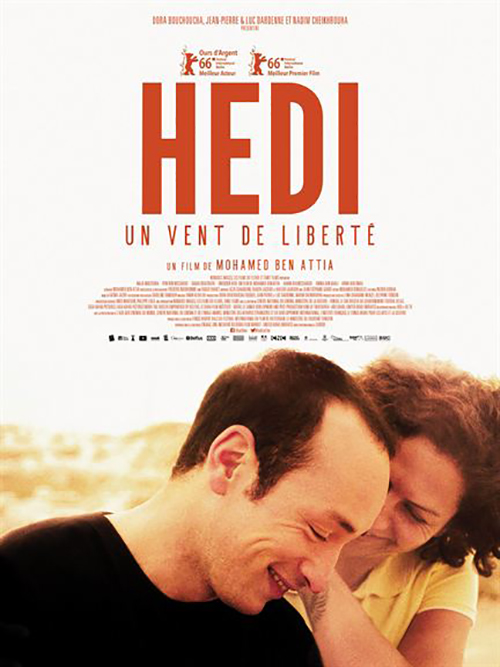 Written and directed by: Mohamed Ben Attia
Written and directed by: Mohamed Ben Attia
Cast: Majd Mastoura (Hedi), Rym Ben Messaoud (Rim), Sabah Bouzouita (Baya), Hakim Boumessoudi (Ahmed)
Synopsis: Winner of the Best First Feature at 2016’s Berlinale, this sensitive, absorbing drama is set in the historic Islamic city of Kairouan, in contemporary Tunisia. Hedi is a dutiful young man working as a car salesman. Apart from his passion for drawing and comics, Hedi is passively going through the motions of a life that his domineering mother Baya has laid out for him. This includes an impending arranged marriage to the docile, incurious Khedija. Then, on a business trip he meets Rim, an activities coordinator for a resort hotel. Rim is everything Khedija is not: independent, ambitious, worldly, free-spirited. For the first time in his life, Hedi sees a possibility to escape the suffocating dictates of his mother, and to pursue his passions on his own terms. But can he turn his back on deep-seated tradition and family obligation? Like an entire generation of post-revolution Tunisians, Hedi is torn between the old forces of social convention and the heady, seductive pull of liberation. Majd Mastoura won Berlinale’s Silver Bear for his portrayal of the conflicted Hedi.
Production Notes: In 2011, Mohamed Ben Attia, a promising writer/director with several award-winning shorts under his belt, saw Tunisian president Ben Ali swept from power during the Jasmine Revolution. The ensuing era of social upheaval would become the inspiration for Hedi. Ben Attia has even compared the sullen melancholy of his main character to the prevailing mood in Tunisia. Ben Attia studied finance before sidestepping to a career in film. One of his first jobs was that of a salesman, just like Hedi. As with most of his short films, Hedi is a character-driven story. This is partly why the Dardennes brothers joined the project as producers. They were close advisors during the script development phase, and the finished film echoes the compassion and bare bones naturalism that has become a signature of their work.
Our review (French) : https://mulderville.net/fr/critiques/4588/hedi-un-vent-de-libert
Ladies (De plus belle) (2017) (98mns)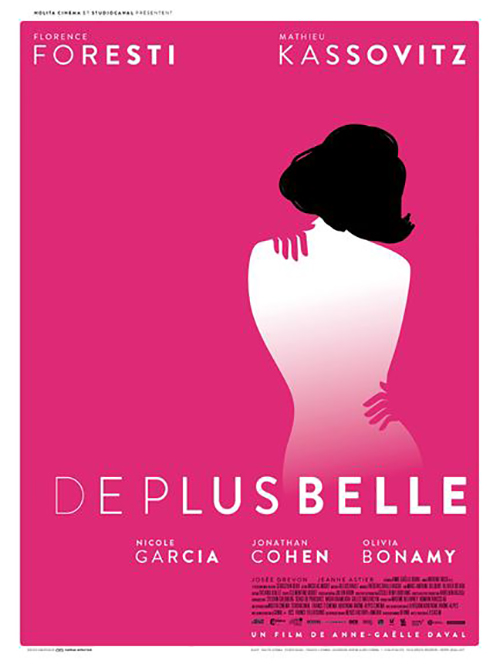 Written and Directed by: Anne-Gaëlle Daval
Written and Directed by: Anne-Gaëlle Daval
Cast: Florence Foresti (Lucie), Mathieu Kassovitz (Clovis), Nicole Garcia (Dalila), Jonathan Cohen (Frédéric), Olivia Bonamy (Manon), Josée Drevon (Yvonne)
Synopsis: Cancer survival is an established trope in film, but this empathetic debut feature tells the less familiar story of a woman trying to recover from her recovery. Comedian Florence Foresti shakes off her brash persona to inhabit the role of Lucie, a skittish and insecure single mother. Lucie’s breast cancer is in remission, but she left her self-esteem back in a hospital bed. Naturally she is dumbfounded when local lothario Clovis (Kassovitz) shows interest of the romantic sort. She can’t understand how anyone could love her. Then she meets Dalila, a vivacious dance teacher who knows what to do. Dalila convinces Lucie to enroll in a dance class tailored to women like her, a class that will culminate in a display of public nudity. Dispensing equal doses of touching intimacy and acerbic humor, De Plus Belle throws down a convincing challenge to conventional standards of feminine beauty.
Production Notes: If the themes of positive body image and questioning notions of beauty seem ambitious for a first film perhaps it’s because writer/director Anne-Gaëlle Daval had come to them in a roundabout way. Initially, Daval was motivated to write a script that would allow her to create cabaret costumes. Since 2003, she has worked as costume designer for film and television. Daval was the costume supervisor for Kaamelott, the hit M6 comedy sendup of the King Arthur legend that ran from 2005 to 2009. After nearly 300 episodes of the show, she desperately wanted a break from all the armor and robes. But what began as a vehicle for cabaret soon evolved into a story about recovery and womanhood. Daval had expected to work with less established actors, so when Mathieu Kassovitz joined the cast, she rewrote the script to make his role more consequential.
Latest news fom The cosmos (Dernières nouvelles du cosmos) (2016) (85mns)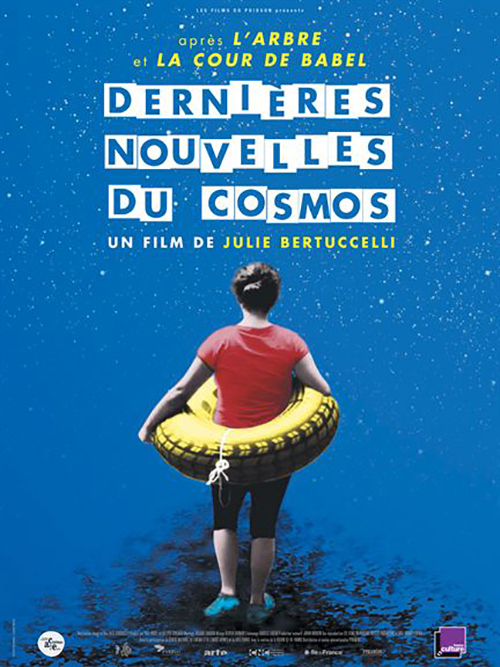 Written and Directed by: Julie Bertuccelli
Written and Directed by: Julie Bertuccelli
Synopsis: At the age of 8, Hélène Nicolas was diagnosed with severe autism and placed in an institution. But this 2017 Best Documentary César nominated film is not about disability, but rather the discovery of a special ability. Dissatisfied with Hélène’s progress, her mother Véronique quits her job so that she can devote herself full time to Hélène’s care. Up to this point Hélène had been completely unable to communicate, but Véronique is astonished to discover that Hélène is able to place letters in a sequence, like a scrabble game, in order to make words. Not only that, but Hélène has a gift for language, creating surreal and playful poems with wit and insight. In the decade since Véronique made the discovery, Hélène has fashioned an alter ego for herself called Babouillec and published several books of poetry. These works, adapted to the stage by the prestigious Avignon International Theater Festival, are a window into a mischievous mind reveling in a liberated inner world, yet capable of striking observations about the outer world. While Hélène’s creative process is explored, it’s the glimpses of her relationship with her patient and dedicated mother that touch us most.
Production Notes : As a chronicler of contemporary French society, writer/director Julie Bertuccelli honed her craft in television, where she made documentaries on subjects ranging from the judicial system to the day-to-day workings of the giant Paris department store, Galleries Lafayette. In 2013 she struck a chord with audiences for School of Babel, an uplifting report on a special school for foreign students aimed at integrating them into French society. The film went on to be nominated for a Best Documentary César. Although known as a documentarian, Bertuccelli won the Critics’ Week Grand Prize in Cannes, and the César award for Best First Film for her 2003 feature debut Since Otar Left. Her second feature, The Tree (2010), a drama about family bereavement, earned Charlotte Gainsbourg a César nomination for best actress.
Le cercle rouge (Le cercle rouge) (1970) (150mns)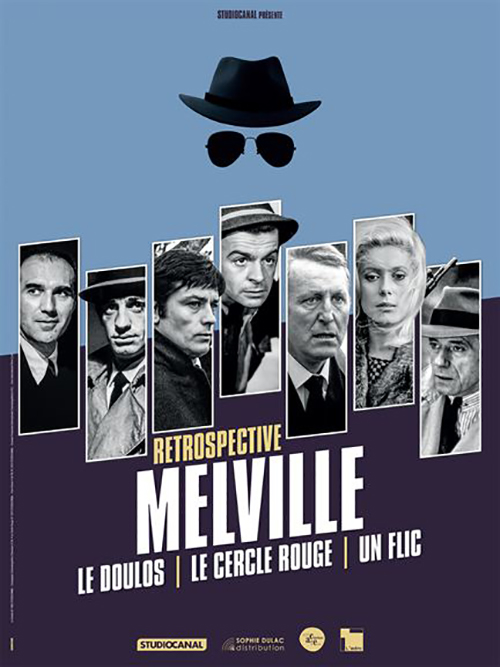 Written and directed by: Jean-Pierre Melville
Written and directed by: Jean-Pierre Melville
Cast: Alain Delon (Corey), Bourvil (Inspector Mattéi), Gian Maria Volonté (Vogel), Yves Montand (Jansen), François Périer (Santi)
Synopsis : In celebration of the 100th anniversary of Jean-Pierre Melville, the filmmaker who transformed the crime thriller into high art, COLCOA is proud to present his most acclaimed picture, Le Cercle Rouge. With a formidable cast including Alain Delon, Yves Montand, and Bourvil, the boilerplate plot involves a suave criminal mastermind, a vicious escaped convict, a washed-out ex-cop with a knack for hitting bulls-eyes before he started hitting the bottle, and a relentlessly nasty, cat-loving detective methodically hunting them down before they can knock off a prominent jewelry store on Place Vendome. Ostensibly a heist movie, what elevates it is the Melvillian flourishes – finely-honed visuals, poignant fatalism, and an explicit code of honor and loyalty. In Melville’s universe, a Gauloise cigarette is as essential as a gun, and which side of the law you’re on is less important than whether or not you betray trust. Another signature touch, balletic precision, is on glorious display in the film’s 20-minute show-stopping robbery sequence. Presented with the World Premiere of Melville’s restored first film, 24 hours of a Clown’s Life.
Production Notes : 1970 was a very good year for writer/director Jean-Pierre Melville. Le Cercle Rouge had just crowned a string of successes including Le Samouraï (1967) and Army of Shadows (1969). Melville’s recent box-office triumph might have surprised some: after all, his films were often bleakly pessimistic, his characters could be grimly laconic, and their endeavors, no matter how heroic in effort, often came to pointless ends. Known mostly for his gangster epics like Bob le Flambeur (1955), Melville re-imagined the criminal world as a battleground of moral and philosophical ideas, much the same way the West had functioned in American cinema. In this arena, a man’s conduct was beyond the dictates of state and law, subject to something more essential within him. It is possible that Melville’s preoccupation with honor began in WWII, during which he fought in the French Resistance. For him, the resistance fighter and the gangster both live in a kind of underworld where loyalty is the primary currency. Sadly, despite the ringing kudos of 1970, Melville would go on to complete only one more film, Un Flic (1972), a lackluster effort that he would disown shortly before his death in 1973.
Like Crazy (Folles de joie) (2016) (116mns)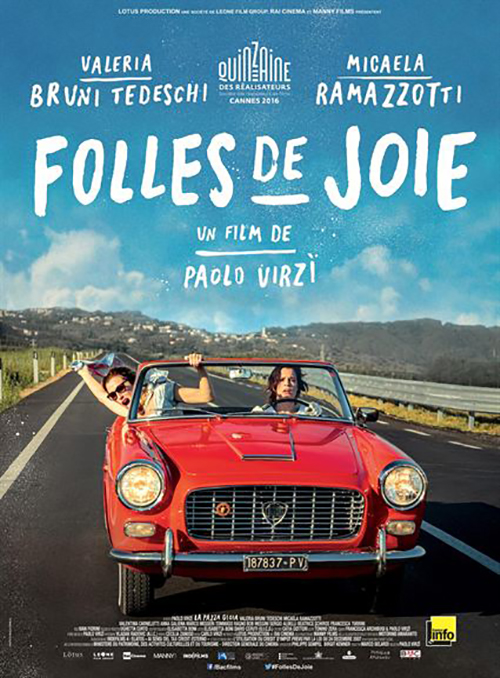 Directed by: Paolo Virzi
Directed by: Paolo Virzi
Written by: Paolo Virzi, Francesca Archibugi
Cast: Valeria Bruni Tedeschi (Beatrice Morandini Valdirana), Micaela Ramazzotti (Donatella Morelli), Bob Messini (Pierluigi Aitiani), Sergio Albelli (Torrigiani)
Synopsis : Actresses Valerie Bruni Tedeschi and Micaela Ramozzotti are at the height of their games as comically mismatched escapees from a mental institution. The story begins in a stately Tuscan villa converted into a retreat for unstable women. Beatrice (Tedeschi) is an entitled, manically motor-mouthed compulsive liar. Donatella is a withdrawn depressive, deeply damaged by life. As much as Donatella dwells on the past, Beatrice lives for the moment, so when she sees an opportunity to get away from hospital staff, she seizes it, with Donatella in tow. The two hit the road on an outlaw odyssey that includes sexy cars, expensive dinners, fortunetellers, an ex-this and a former-that, and any manner of self-medicating, all without a Euro to scrounge between them. They aim to find happiness, but that turns out to be a tricky thing to nail down. Even a lighthearted jaunt in the Tuscan sun can take you to a deeper, more emotionally resonant destination.
Production Notes: Known for comedies built around unhappy situations, writer/director Paolo Virzi is a latter day torch-bearer for the Commedia all'italiana tradition. Virzi got his start as a screenwriter for features and television, often teaming up with childhood friend Francesco Bruni. The pair wrote Virzi’s debut feature, La bella vita, in 1994, which took the David di Donatello Award for Best New Director. Virzi has worked with both of his leading ladies before. Ramozzotti was awarded a Best Actress Donatello for her performance in Virzi’s The First Beautiful Thing (2010). The film would go on to be Italy’s entry for the Best Foreign Language Film at the 2011 Academy Awards. Valerie Bruni Tedeschi played a high-society housewife in Human Capital (2014), Virzi’s adaptation of the Stephen Amidon novel about the 2008 financial crisis. Virzi’s first English language film, The Leisure Seeker, starring Helen Mirren and Donald Sutherland, is set for completion in 2017.
Little Gems (Les Pépites )
Our review (French) : https://mulderville.net/fr/critiques/4446/folles-de-joie
Mr & Mrs Adelman (Monsieur et Madame Adelman) (2017) (120mns)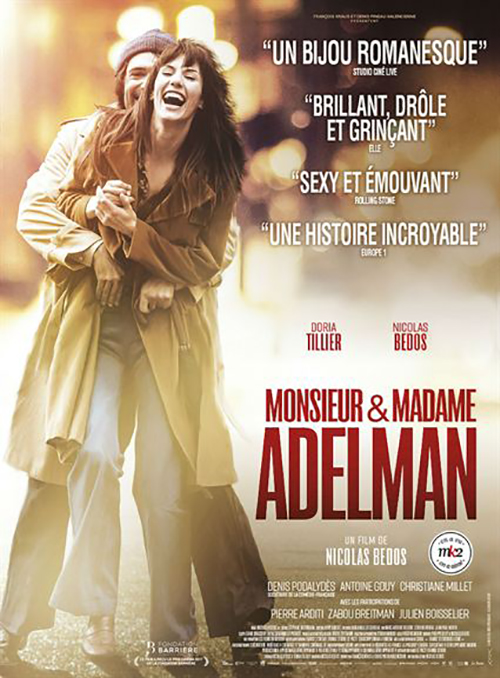 Directed by: Nicolas Bedos
Directed by: Nicolas Bedos
Written by: Nicolas Bedos, Doria Tillier
Cast: Doria Tillier (Sarah Adelman), Nicolas Bedos (Victor Adelman), Denis Podalydès (The shrink), Antoine Gouy (The journalist), Christiane Millet (Mrs. de Richemont), Pierre Arditi (Claude de Richemont)
Synopsis : This feature debut from comedic bad boy Nicolas Bedos is a literate and funny celebration of couplehood. When famous author Victor Adelman dies, a journalist contacts his wife Sarah, hoping to get a scoop on the great writer’s life. Her account of their story together is a personal odyssey that begins with Sarah first convincing Victor, then his parents, that she is the right woman for him. As Victor the bright and promising lover turns into Victor the egocentric and anguished husband, Sarah doubles down on her devotion. She is his rock when times are tough, his muse when inspiration falters. But their marriage faces the biggest test when Victor’s true mistress, fame, enters the picture. Walking a razor’s edge between bitingly cynical and scathingly romantic, Mr. & Mrs. Adelman chronicles half a century of passions, ambitions, victories, secrets, and betrayals; a whimsical tribute to the madness and wisdom of the idea of sharing a life with someone. Former Canal+ “weather girl” Doria Tillier is exceptional in her film debut as the strong but enigmatic force behind the public figure.
Production Notes : Actor/writer/director Nicolas Bedos was quick off the starting blocks, landing a writing job at Canal+ at the age of 18. From there he began writing material for his father Guy Bedos, an iconic figure in Gallic stand-up comedy. Bedos came into his own as a writer in 2005 when his play Sortie de Scène was nominated for a Molière Award. Three more plays followed in rapid succession, along with more writing for television. Bedos emerged as a controversial public figure when he began performing provocative sketches satirizing French politics for television. In addition to his work on both sides of the camera, Bedos composed music for the film, along with Philippe Kelly.
Our review (French) : https://mulderville.net/fr/critiques/4645/monsieur-et-madame-adelman
Not here to be loved (Je ne suis pas là pour être aimé) (2005) (93mns)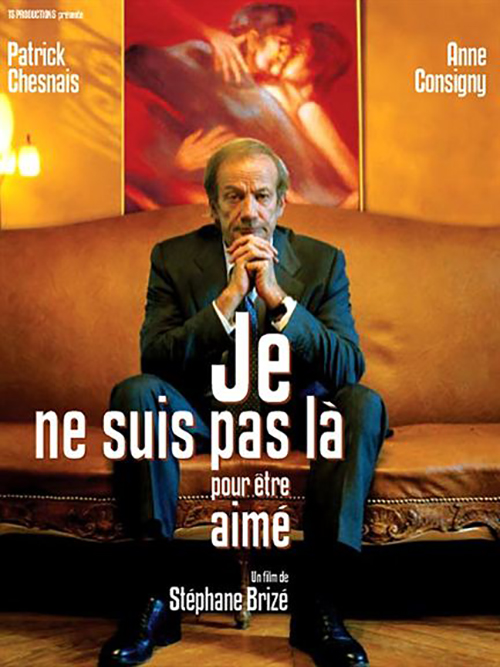 Directed by: Stéphane Brizé
Directed by: Stéphane Brizé
Written by: Stéphane Brizé, Juliette Sales
Cast: Anne Consigny (Françoise "Fanfan" Rubion), Patrick Chesnais (Jean-Claude Delsart), Georges Wilson (Mr. Delsart), Lionel Abelanski (Thierry)
Synopsis : As part of our focus on filmmaker Stéphane Brizé, COLCOA is pleased to reprise his deft romantic drama, Not Here To Be Loved, presented at the festival as a U.S. Premiere in 2006. This deceptively simple story centers on Jean-Claude, a weary, middle-aged divorcee whose life isn’t exactly going anywhere. Circling the drain is more like it. As a court bailiff, his daily routine brings misery to others in the form of eviction notices and property seizures. His only outlet is the weekly rest home visit to his craggy, belligerent, ungrateful father, who had Jean-Claude’s thankless job before him. To top it all off, Jean-Claude’s doctor informs him that his health is failing. Looking for an exercise regimen, Jean-Claude signs up for tango lessons, where he meets the too young, too pretty, and too betrothed Françoise. Despite the obstacles, a romance blossoms, and the connection soon has them both re-thinking life’s possibilities. Georges Wilson (father of Lambert Wilson) brilliantly channels rage and fear at the ravages of old age as Jean-Claude’s father, while Patrick Chesnais and Anne Cosigny bring a heartrending chemistry to the screen. César nominations went out for Best Actor, Best Actress and Best Supporting Actor.
Production Notes: Not Here To Be Loved was only the second feature of writer/director Stéphane Brizé, but already he was displaying qualities that would come to be associated with all of his work: authenticity and sensitivity coupled with light humor and strong poetic moments. Brizé’s emotionally stifled characters, like his protagonist Jean-Claude, elicit comparisons to filmmakers like Ken Loach and Bergman. While the framework of the story is rather familiar and straightforward, Brizé and his co-writer Juliette Sales focus our attention on the details that can lend performances a more layered meaning. Brizé’s first feature, Le Bleu des villes (1999), was a box office success; nevertheless, it was six years before his next film. From there, his output has been more regular, including his Claude Lelouch produced Entre Adultes (2006), his delicate tale of unexpected romance, Mademoiselle Chambon (COLCOA 2009), A Few Hours of Spring (COLCOA 2013), and Measure of a Man (2015). In conjunction with this screening, COLCOA will present the North American Premiere of Brizé’s latest film, A Woman’s Life (2016)
Open at night (Ouvert la nuit) (2017) (97mns)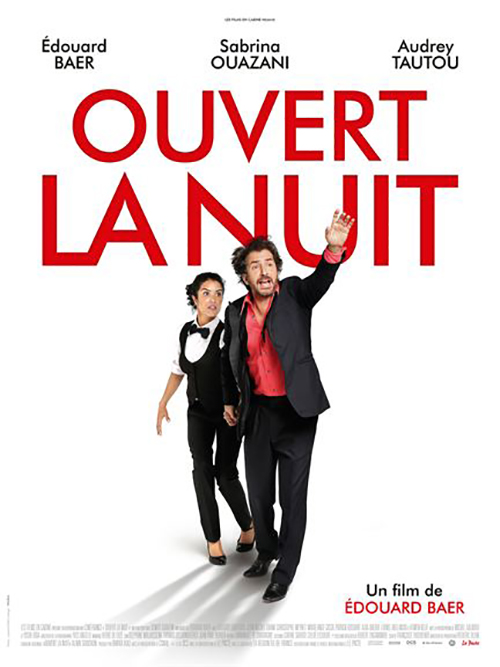 Directed by: Édouard Baer
Directed by: Édouard Baer
Written by: Édouard Baer, Benoît Graffin
Cast: Edouard Baer (Luigi), Sabrina Ouazani (Faeza), Audrey Tautou (Nawel), Grégory Gadebois (Marcel), Christophe Meynet (Chris), Michel Galabru (himself)
Synopsis : Taking flight where Martin Scorcese’s After Hours touched down, this jubilant comic vehicle for Édouard Baer doubles as an affectionate homage to the timeless allure of the City of Light. Baer’s swaggering buffoon persona is unleashed as Luigi: theater impresario by trade, irresistible charmer by aspiration, and inexhaustible scoundrel by nature. Over the next 24 hours, he’ll need to call on his most dubious qualities. On the eve of opening night, Luigi’s new play is teetering on financial collapse. His cast and crew threaten a walkout if they don’t get paid, and his temperamental Japanese director demands a live chimpanzee for the performance. Even his faithful assistant Nawal (Tautou) has deserted him, leaving Luigi to set off into the Parisian night with his no-nonsense intern Faeza. Their quest for a chimp and a chump takes them on a delirious tour of the city’s most absurdly charming offerings, from Bollywood shoots to African communes. When Luigi’s deeper fragilities surface, his recklessness escalates into a quixotic high wire act. But who will be there to catch him when he falls?
Productions Notes: Actor, radio host, comedian, César Awards MC, celebrity personality. With all of that going on it’s easy to overlook the fact that Édouard Baer has directed and written or co-written three feature films. After studying acting, Baer found success with Ariel Wizman co-hosting an offbeat show for Radio Nova. From there the two were conscripted as writers for the now legendary Canal+ satirical show Nulle Part Ailleurs. Baer began to appear before the camera with short sketches at the end of the show. In addition to acting in dozens of films including The Story Of My Life (COLCOA Audience Award winner 2005) and Hopefully (COLCOA 2016), Baer has performed in the theater, notably La Folle et Véritable Vie de Luigi Prizzoti, a music hall piece mixing cabaret and circus. Baer took his directorial bow with La bostella (2000), a comedy in which he plays a fictitious version of himself. His second feature Akoibon (2005) starred Jean Rochefort as the target of the mafia on an island full of oddballs and misfits. Baer wrote the script for Open At Night with writer Benoit Graffin, who is known for Priceless (COLCOA 2007).
Our review (French) : https://mulderville.net/fr/critiques/4611/ouvert-la-nuit
Playtime (Playtime) (1967) (124mns)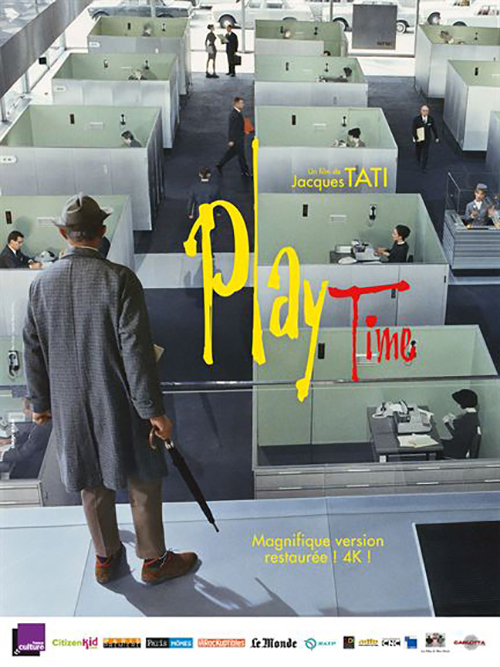 Directed by: Jacques Tati
Directed by: Jacques Tati
Written by: Jacques Tati, Jacques Lagrange, Art Buchwal
Cast: Jacques Tati (M. Hulot), Barbara Dennek (Barbara), Jacqueline Lecome (Barbara’s friend), John Abbey (M. Lacs), Valérie Camille (M. Lacs’s assistant), Billy Kearns (M. Schultz)
Synopsis : On the occasion of the film’s 50th anniversary, COLCOA is pleased to present Playtime, Jacques Tati’s most inventive and ambitious film. Completed in 1967 after nearly three years in production, this was Tati’s droll response to Charles De Gaulle’s push to remake Paris into a modern city. The sparse plot unfolds in a series of six set pieces over a 24-hour period. American tourist Barbara and a certain bemused local, Monsieur Hulot, have several chance encounters. Barbara tries to discover authentic France in an homogenized city whose iconic monuments have been replaced by photographic simulations. Meanwhile, Hulot blunders through a sterile world of glass and steel, a traditionalist bull in the china shop of modernity. Daring in scope and concept, the film establishes a society regimented by soulless conformity, and then proceeds to break that down through a series of silly mishaps. For Tati, the sublime optimist, these moments of comic chaos and whimsy were the humanizing elements that make joyless dystopian futures bearable.
Production Notes: In 1958, writer/director Jacques Tati was riding a wave of success. His new film Mon Oncle won the Jury Prize at Cannes as well as an Oscar for Best Foreign Language Film. The raincoat and long-stemmed pipe of his bungling alter ego Monsieur Hulot had become as iconic as the Tramp’s baggy trousers and bowler hat. But Hulot was a hindrance to Tati’s greater ambitions. He had a vision for a style of film that emphasized situation over character. He considered close-ups crude. He wanted to let the audience decide what was most deserving of their attention. His next picture was to be the fulfillment of those ambitions. The most expensive French film of its era, Playtime was nearly a decade in the making. Tati constructed entire city blocks of his modernist Paris from scratch, overseeing the tiniest of details. Every frame of the finished film bursts with visual pun so much so that some claim it requires several viewings to truly appreciate. A committed artist, Tati bet everything on his new venture. When the film proved a commercial failure, Tati was financially ruined. For a time, the film was infamous for having sunk Tati’s career. Today, it is celebrated as the most fully realized work of a remarkable visionary.
Polina (Polina, danser sa vie) (2016) (108mns)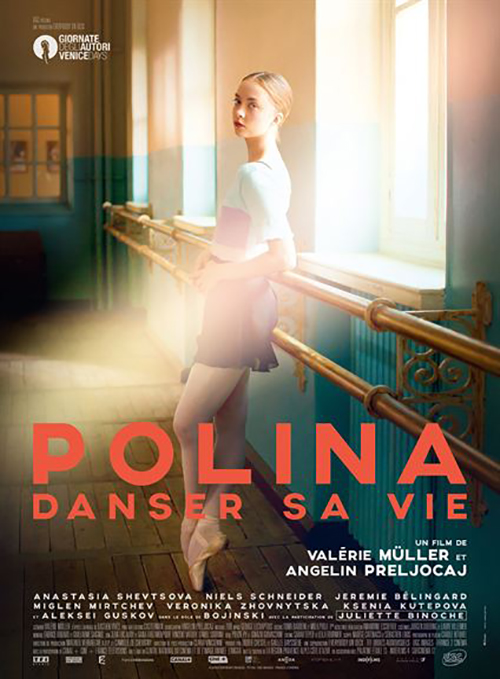 Directed by: Angelin Preljocaj, Valérie Müller-Preljocaj
Directed by: Angelin Preljocaj, Valérie Müller-Preljocaj
Written by: Valérie Müller-Preljocaj
Cast: Anastasia Shevtsova (Polina), Niels Schneider (Adrien), Juliette Binoche (Liria Elsaj), Veronika Zhovnytska (Polina as a child), Jérémie Bélingard
Synopsis : This love-letter to the world of ballet and dance follows a young dancer’s initiation into adulthood and her journey to find her place as an artist. Based on the popular Bastien Vivès graphic novel, this artful adaptation begins in Moscow, where the gifted Polina studies ballet under the dictatorial tutelage of Professor Bojinsky. His standards for technique border on the sadistic, but the pugnacious ballerina sticks it out and is rewarded with an opportunity to join the world famous Bolshoi. Polina’s years of grueling effort, not to mention the sacrifices of her parents, are put into jeopardy however, when she meets the charming French dancer Adrien and discovers contemporary dance. Transformed, Polina questions everything she has worked for. Given a chance to study under the famed modern-dance guru Liria Elsaj (Binoche), Polina must face the first major crossroads in her life. Graced with sublime dancing set-pieces performed by Jérémie Bélingard, star of the Paris National Opera, and mesmerizing newcomer Anastasia Shevtosa.
Production Notes: Husband and wife co-directors Angelin Preljocaj and Valérie Müller Preljocaj had been looking for a fiction project that incorporates

